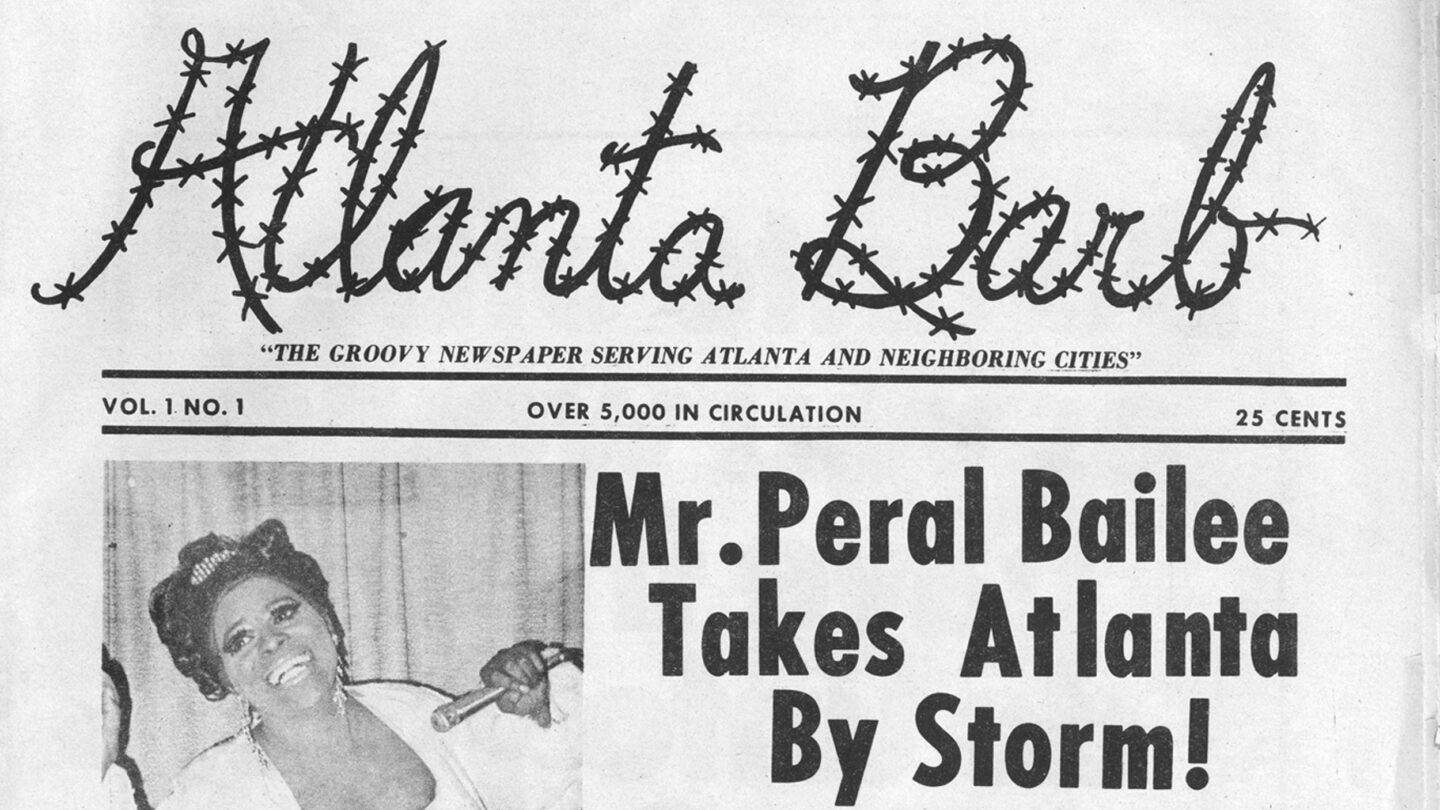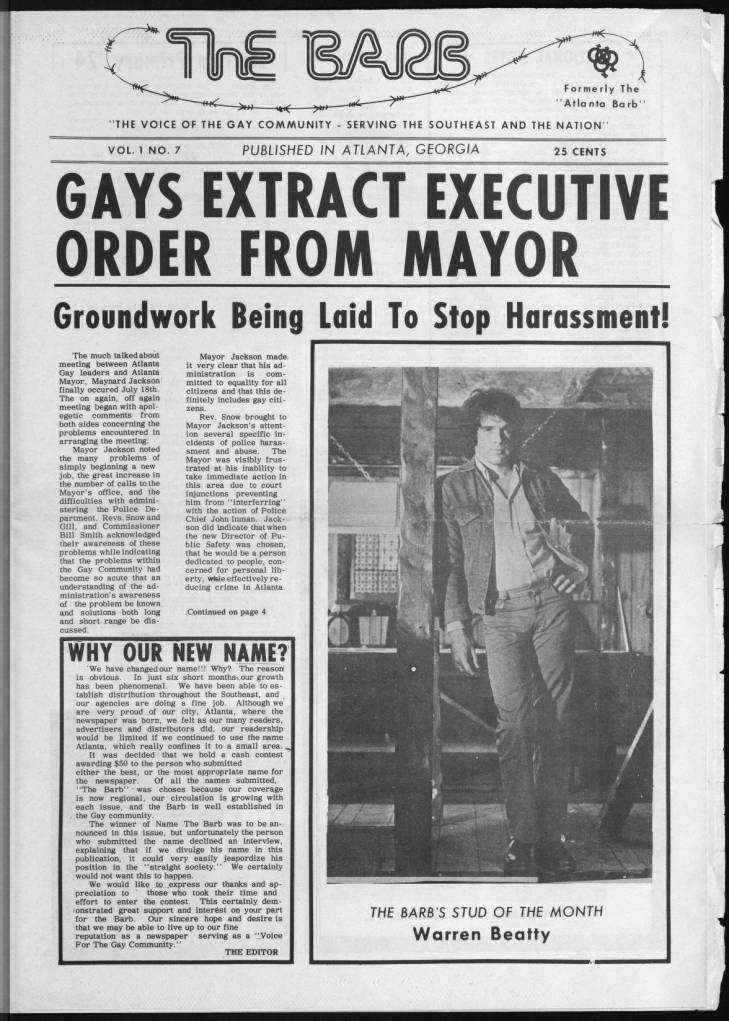
One of Atlanta’s first LGBTQ publications has now been digitized and is keyword and text searchable online. The Barb, a free serial newspaper published from 1974–1977 in Atlanta, contained articles on a variety of subjects relevant to its in-town LGBTQ audience, including arts and entertainment, health, politics, and community events. By fully digitizing the collection, researchers are now able to unpack a crucial time in the history of Atlanta’s LGBTQIA+ community from anywhere in the world.
The Barb is part of our expansive collection of serial papers and publications on a range of subjects related to the city’s history. The Kenan Research Center’s digitized collection of The Barb contains over 600 pages of text and photographs within 40 issues published over four years. In order to offer the paper’s complete run in its entirety, three of the included issues were sourced in partnership with the University of California, Davis Shields Library (vol. 3, no. 5) and Cornell University Library, Division of Rare and Manuscript Collections (vol. 3, no. 2 and vol. 4. no. 5).
Atlanta History Center is an active member of the Georgia LGBTQ Archives Project, which seeks to preserve our state’s LGBTQ past for future generations. The Project is committed to connecting members of the LGBTQIA+ communities with local collecting organizations like Atlanta History Center. It also encourages members of the community to recognize the value of their collected materials as part of the historical record—including photo albums, t-shirts, pins, protest signs, and papers like The Barb, amongst many more examples.

The Barb, Vol. 1, No. 7, pg 1
Why digitize?
Like other paper materials, particularly newspapers, The Barb will break down with age and handling. By digitizing the collection, we prolong the life of the physical materials while also making their content more widely accessible. Even more pertinent during the COVID-19 pandemic, researchers are now able to access the full collection easily from home, instead of needing to request physical materials from our archives.
We are pleased to make The Barb and Atlanta’s LGBTQIA+ narratives available to a wide readership during this unprecedented time. We are always seeking ways to lower the barrier of entry for our patrons, and digitizing this collection is a natural fit.
The Barb (Vol. 1, No. 9, pg. 2) contained local and regional news, advertisements, and community services.
What can The Barb tell us?
The 1970s saw an exponential increase of bars, restaurants, clubs, lounges, bookstores, community centers, and sports teams that catered to gay clientele. These spaces became safe havens for Atlanta’s LGBTQ communities. In that spirit, Ray Green founded Atlanta Barb, later renamed The Barb, in 1974. The digitized collection now available on Album affords researchers an inside look at the resources available to, and the interests of, Atlanta’s LGBTQIA+ community in the 1970s.
Journalist and nonfiction author Martin Padgett regularly uses The Barb in his research. “Reading the entire collection of The Barb, I learned much about the progress in the gay community in Atlanta, and also, the frustrations of activists who pressed closeted gays and lesbians and transgender people to offer visible support to the movement,” said Padgett, who funded the digitization project. “The Barb, like many other LGTBQ media outlets, has a sometimes-odd mix of adult-themed content and politically charged commentary. In dozens of issues, published from 1974 to 1977, it reveals the sometimes chaotic and conflicting nature of the forces that had begun to draw the community together, while it plots out the aspirations of a movement that would not be fully realized until the early part of this century.”
The Barb also provides insight into the lives of major figures in Atlanta’s history, including Bill Smith. Ray Green sold the paper to Smith, one of the publication’s editors, in 1975. Smith helped found the Georgia Gay Liberation front, served in the Southeastern Gay Coalition, coordinated the city’s 1973 Gay Pride Week, and—perhaps most significantly—was the first openly gay man hired by the City of Atlanta when he served as Community Relations Commissioner from 1973 to 1976. According to Padgett, The Barb became Smith’s “platform as he pressed Mayor Maynard Jackson for an end to harassment of gay men and women in Piedmont Park, and as he began to push the city of Atlanta to adopt a gay-rights ordinance.”
Smith wrote a column on community activities, politics, and how laws affected the gay community. The Barb featured regular columns from other local activists and community leaders, who lent their voices a widely circulated platform. Columns included movie and theater reviews, updates on local drag shows and competitions, classified and personal ads, as well as health and sex advice. Through this content, The Barb was more than a newspaper, it was a lifeline to many.
The Barb, Vol. 4, No. 1, pg 1
Tell Us More
Both as members of the Georgia LGBTQ Archives Project and as a history center dedicated to telling the full history of our city, Atlanta History Center is actively seeking to expand our LGBTQIA+ collection. The story of gender equity is still unfolding, and we would like to capture this history as it happens. In particular, we’re looking for stories from Atlanta’s lesbian and gender minority communities but welcome all donations.
If you have materials you would like to share with us, please drop us a line. Materials that we collect vary from 2D archival material like journals, letters, documents, photos, film, and video to 3D objects like textiles, locally made items, signs, and disco balls. (You read that right, and there is a story there.) Our priority is to collect items that help us tell a more complete story about Atlanta and its environs.
If you would like to learn more about Atlanta History Center’s LGBTQIA+ holdings, we invite you to explore Kenan Research Center, located at 130 West Paces Ferry Road, Atlanta, Georgia 30305. Our hours of operation are 10:00am–5:00pm, Tuesday–Saturday, by appointment. You may contact us by calling 404.814.4040 or emailing at reference@atlantahistorycenter.com.
